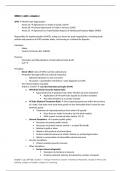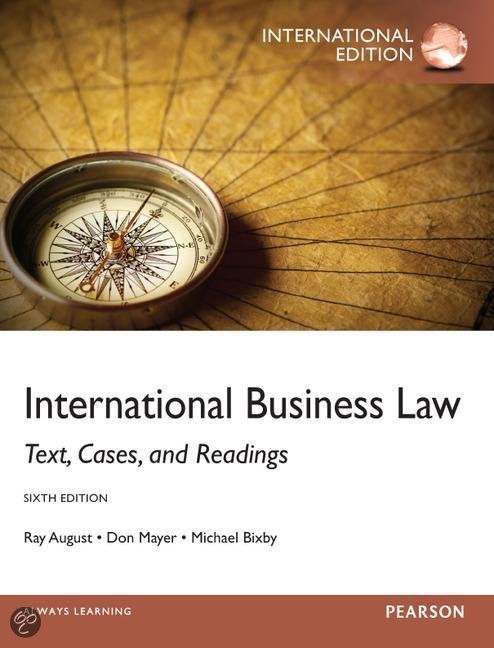WEEK 9 – GATT – Chapter 7
WTO World Trade Organization
- Annex 1A Agreements on Trade in Goods ( GATT)
- Annex 1B General Agreement of Trade in Services (GATS)
- Annex 1C Agreement on Trade Related Aspects of Intellectual Property Rights (TRIPS)
Responsible for implementation of WTO, acting as a forum for trade negotiations, reviewing trade
policies and practices of WTO member states, and serving as a tribunal for disputes
Members:
- States
- Custom Territories (EU, ASEAN)
Purpose:
- Promotion and liberalisations of International Trade (LoIT)
- LoIT
Principles:
- Direct effect (rules of WTO override national law)
- Protection through tariffs (on national industries)
o National industries (so not economic)
o No quotas / quantitative restrictions / taxes disguised as tariffs
- Non-discrimination (equality)
- Article 1 of GATT non-discrimination principle (N-DP)
o MFN Rule (Most Favourite Nation Rule)
Equal treatment of products from other MS that ask to be imported;
Applications of MS tariff rules equally to all other members
Non-discrimination at a country’s border
o NT Rule (National Treatment Rule) Once imported goods are within the territory
of a state, that state must treat those goods no less favourably than it treats its own
domestic goods.
Treatment of imported products from other MS equally
Once they are inside its borders (on the local market)
With respect to internal taxes (article 111.2)
o General Exceptions: to protect public policy
Necessary to protect public morals
Necessary to protect human, animal =, or plant life/health
Related to gold or silver
Relate to the products of prison labour
Protect national treasures of artistic, historic or archaeological value
Relate to conservation of exhaustible natural resources
o Security exceptions:
Protect essential security interests
o Other exceptions
Escape clause (safeguards)
Emergency & temporary measure
Protects particular industry threatened by number of imports
Chapter 7, pp. 365-426, Chapter 5: Foreign Investment, Chapter 9 Intellectual Properties, Chapter 6 Money and
Banking, chapter on Taxation, Chapter 12: Financing
,GATT Policy: Regional (economic) Integration
- Purpose Promotion and Liberalisations of international trade at regional level
- Means:
o Free Trade Area: Benelux, NAFTA, ASEAN, afCFTA
o Customs union: EU, Central American Common Market, CEMAC
- Brexit
EU Supranational, trias politica, all EU member states equal
USA view no general agreements on trade, trade agreements with individual states. (EU is to
strong – divide policy)
Multilateral Trade Agreements
The regulatory agreements deal with:
- Customs valuation
o Evaluation of imported goods for tariffs’ purpose
o Evaluation method
- Preshipment inspection
o Checking of goods in the port of loading of developing countries
o Prevention of under-invoicing & fraud
- Technical Barriers to Trade (TBT Agreement)
o Technical regulations and standards
Protection for the life and health of humans, animals, and plants, and the
environment
Prevent deceptive practices
Requirement; must NOT create unnecessary obstacles to trade
May constitute exceptions to GATT’s N-DP
- Sanitary and phytosanitary measures (SPS Agreement)
o Protection for the life and health of humans, animals and plants, and the
environment
May constitute exceptions to GATT’s N-DP
Sanitary hygiene, spread of pests and diseases and form risks arising from
toxins and contaminants
Phytosanitary produced food (animal and plant) (genetically enhanced)
- Antidumping
o Selling exported goods at prices below their normal value
o Not prohibited/when becomes prohibited?
- Safeguards
The Sectoral agreements:
- Agriculture
- Textiles and clothing
- Rules of Origin
o Laws, regulations, and administrative procedures
o Purpose: determine the country of origin of goods
o The agreement on rules of origin:
Harmonisation of rules of origin
Non discrimination rules:
Chapter 7, pp. 365-426, Chapter 5: Foreign Investment, Chapter 9 Intellectual Properties, Chapter 6 Money and
Banking, chapter on Taxation, Chapter 12: Financing
, May be discriminatory
May constitute exceptions to GATT’s Non-DP
Purpose:
- To avoid impediment of barrier to free import/export
- May be discriminatory
WTO Panel decision makes the decision if something may be banned / discriminated
WEEK 10 – Chapter 5 – foreign Investment
Foreign Investment (FI)
- Ownership (one person)
- An enterprise
o 10% = of the controlling interest
o Not located in the owners’ home country
FI is regulated by Foreign Investment Law & Codes
- Bilateral Investment Treaties (BIT)
- Can promote and restrict investments through screening and regulating applications
o Level of regulation differ per country
Open minimal regulations
Closed strong regulations & Supervision
Developing economies & economies going from closed to open tend to have
more regulations
Law & Codes National Foreign Investment Policies (Regulations)
Purpose:
- Promoting local productivity and technological development
- Encouraging local participation
- Minimizing foreign competition in economic areas already well served by local businesses
Screening of FI Applications:
Requirements:
- Register/apply with the designated government
o Financial plan, business plan, local involvement ect.
- Obtain governmental approval
o Government evaluation may look at contribution to local economy, opportunity for
technology transfer, impact on local markets ect.
FI limitations:
- The kinds of business forms
o Have/include local participation
o Obliged to fully disclose their activities to the public scrutiny
- Percentage of (foreign) equity or shares in local businesses
o May own up to certain percentage of equity
- The Economic sectors (Sectoral [sectorial] Limitation)
o Sectors exclusive for the state or its nationals
Chapter 7, pp. 365-426, Chapter 5: Foreign Investment, Chapter 9 Intellectual Properties, Chapter 6 Money and
Banking, chapter on Taxation, Chapter 12: Financing






